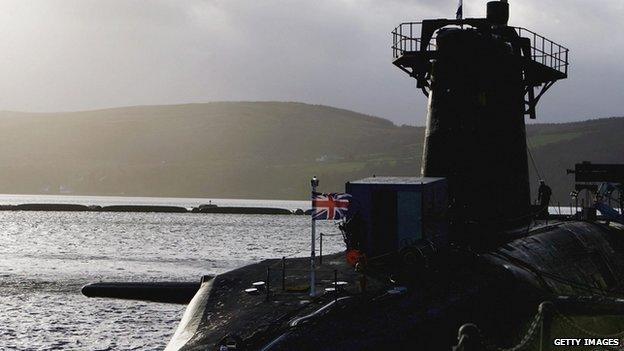Nuclear weapons 'outlawed' in an independent Scotland, says Salmond
- Published

Nuclear weapons carrying submarines currently reside at the Faslane Naval base on the Clyde
The leader of the SNP has said that if his party won power in an independent government it would make nuclear weapons illegal.
Alex Salmond told the BBC's Andrew Marr Show that Trident, which currently resides at Faslane Naval base on the Clyde, would have to go.
He also said a go-alone Scotland would remain a member of the European Union.
Mr Salmond was being interviewed from Perth where his party has been holding its annual conference.
The first minister was asked by the broadcaster to respond to UK government suggestions that moving Trident from Scotland would be "prohibitively expensive".
He said: "The UK government has two choices - they either relocate Trident to another part of the rest of the UK or alternatively they could use nuclear facilities in America or France."
Mr Salmond made a further point that it was possible for a UK government to decide a "much better policy" and decommission its weapons system.
He added: "That would be a matter for the London government. That doesn't mean we think it reasonable to lease out part of Scottish territory to what you [Andrew Marr] describe as a Cyprus situation. If Scotland, by majority, doesn't want nuclear weapons, the SNP proposition is to write that into the constitutions of the state.
"So, that would make the possession of nuclear weapons illegal."
The SNP leader was being interviewed after a decision by his party to back joining nuclear-based military alliance Nato in the event of an independent Scotland.
Following his appearance on the Andrew Marr Show, Mr Salmond reiterated SNP policy to outlaw nuclear weapons during an interview on the Sunday Politics Scotland programme, hosted by Isabel Fraser.
She quizzed him on whether an independent Scotland would prevent nuclear weapons-carrying warships doing exercises in Scottish waters.
Mr Salmond said: "The issue about visiting warships, etc, no country ever confirms the existence of nuclear weapons on its warships - that is well known.
"This is an issue all non-nuclear countries have to face up to within Nato and out of Nato and we will do exactly the same thing."
The first minister's BBC appearances follow a deal reached earlier this week between the Scottish government and UK government on the rules governing a Scottish independence referendum in two years' time.
Mr Salmond and Prime Minister David Cameron signed the Edinburgh Agreement in which it was decided there would be a one-question referendum to be held before the end of 2014.
Sturgeon speech
On the subject of Scotland's membership of the EU in the event of a independence, Mr Salmond told the Andrew Marr Show that it would not lead to "vexed negotiations".
He said: "We are part of the EU, we have been part of it for 40 years. We would be negotiating our positions from inside the EU. I don't think there is any doubt about that. I don't think it will be a vexed negotiation at all.
"There is a large amount of good will toward Scotland in the rest of the EU."
The SNP conference will finish later with a speech by deputy leader Nicola Sturgeon.
She is expected to say that UK Chancellor George Osborne should use the opportunity presented by his forthcoming Autumn Statement to increase capital spending for the UK, including Scotland.